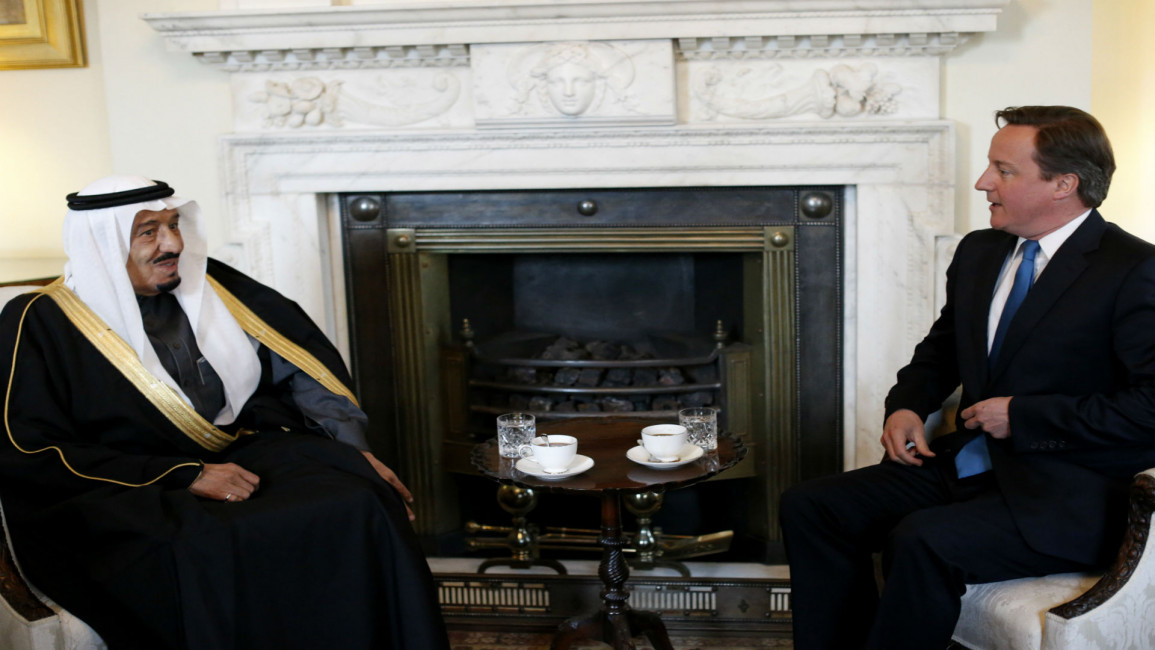
Human rights are out of fashion
David Cameron has been forced to admit to a secret deal with Saudi Arabia to ensure Riyadh was elected to be head of the UN's Human Rights Council, despite its human rights record.
The British prime minister's admission came during questioning by veteran journalist Jon Snow.
Snow repeatedly asked Cameron why the British government took part in such a deal, to which Cameron finally responded that intelligence cooperation with Riyadh was very important to protect British lives against possible terrorist attacks.
| The international community continues to demonstrate a disinterest in human rights violations in the Arab region. |
This means that Saudi Arabia's human rights record, including its sentence against the teenager Ali al-Nimr, who is to be beheaded and crucified, does not matter in the face of the threat of "radical Islam".
The Saudi embassy in London responded to the widespread condemnation of the death sentence by issuing a statement rejecting "interference" in the kingdom's affairs.
Nimr was aged 17 when he was arrested for taking part in demonstrations inspired by the Arab Spring.
Just like Cameron, French Prime Minister Manuel Valls also called on Saudi Arabia to invest in his country - and his visit to Riyadh culminated in the signing of economic, commercial and military agreements worth more than $11 billion.
Meanwhile, opposition to France's lack of pressure on human rights issues with countries such as Saudi Arabia falls on deaf ears.
With the exception of human rights organisations, the international community continues to demonstrate a fundamental disinterest in human rights violations in the Arab region.
Such violations have become an internal issue which hold no value when compared with the primacy of fighting "terrorism".
We have returned to a situation similar to before the Arab Spring, where cooperating with the regimes of the region is thought of as far more important than the human rights violations committed by these regimes.
It seems that talking about human rights has gone out of fashion - especially when considering strategic balances in which the death and repression of people is routine.
So what if Saudi Arabia to decides to behead and crucify a young man for simply taking part in a demonstration?
So what if it punishes the blogger Raif Badawi with imprisonment and public flogging just because he criticised the Saudi religious police?
So what if the regime of General Abdel Fattah al-Sisi in Egypt, the champion of fighting terrorism, decides to jail a child without trial simply because he wore a shirt that said "A country without torture"?
So what if the same regime decides to imprison more than 40,000 opposition members on the ambiguous charge of "supporting terrorism"?
So what if journalists were arrested for doing their jobs and others were banned from travel?
| There is no value to the death of those civilians in their countries, where hundreds and thousands of people die anyway |
So what if Bashar al-Assad's barrel bombs kill hundreds of civilians because the international community does not see an alternative in the war against the bogeymen of the Islamic State group?
There is no value to the death of those civilians in their countries, where hundreds and thousands of people die anyway, thus their deaths can be categorised as "collateral damage" in the strategic game between the world's heavyweights.
In newspaper columns and on television screens we find hundreds of prepared excuses presented by outstanding analysts who try to convince us that it is futile to talk about dictatorships, human rights and the death of civilians in the "barbaric east".
Excuses such as the threat of Islamic extremism and IS, and the failed state in Libya, are used to silence calls for democratisation or foreign intervention to stop massacres, because those are merely domestic issues.
Scores of reports have been written to explain and justify the US and Russian competition over the Arab region, including a report by Chatham House in which the authors describe situation in Syria as "a win-win scenario" for both Washington and Moscow.
Talking about the human toll of the conflict or the immorality of considering Assad as the lesser of two evils is now considered naive and unrealistic.
We are back to where we started, where fighting terrorism is the priority, dictators are in power and prisons are full once more.
Meanwhile, brilliant strategic analysts do not cease to find excuses to convince us that we do not deserve any better.
Fatima el-Issawi is a research fellow at The Middle East Centre studying changes in Arabic mainstream media during democratic transitions. Follow her on Twitter: @ellsawi
Opinions expressed in this article remain those of the author and do not necessarily reflect the opinions of al-Araby al-Jadeed, its editorial board or staff.




